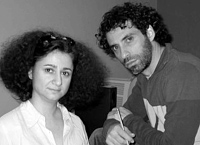
Rabih Mroué | Playwright, director, actor
Born 1967 in Beirut. After graduating from university majoring in theatre studies in 1990, he began putting on his own plays, performances, and videos. Continuously searching for new and contemporary relations among all the different elements and languages of the theatre art forms, Mroué questions the definitions of theatre and the relationship between space and form of the performance and, consequently, questions how the performer relates with the audience. His works deal with the issues that have been swept under the table in the current political climate of Lebanon. He draws much-needed attention to the broader political and economic contexts by means of a semi-documentary theatre.
From theatre practice to politics, and from the problem of representations to his private life, his search for ‘truth’ begins via documents, photos, and found objects, fabricating other documents, other ‘truths’: it is as if the work becomes a dissection table for the dubious processes of Lebanon's war society. With the accumulation of materials, a surrealistic saga unfolds, teasing out the proposition that ‘between the truth and a lie, there is but a hair’. His piece “Looking for a Missing Employee” is an investigative performance in which the artist becomes a ‘detective’ interested in using actual documents to understand how rumors, public accusations, national political conflicts, and scandals act on the public sphere as shaped by print media. Mroué incorporates radical criticism, particularly in his video imagery.
Without losing his peculiar sense of humor, Mroué's “Biokhraphia” (in collaboration with Lina Saneh) shrewdly provides a space to consider the invention of biography, with all its dreams, failings, and idiosyncrasies, within the frame of the beginning of a history. In 2004 Mroué wrote “Who's Afraid of Representation”, a merging of parallel histories of Western performance art and contemporary socio-political events in Beirut.
In 2008 he played alongside Catherine Deneuve in the documentary movie “Je Veux Voir” directed by Joana Hadjithomas, in which he takes the actress to his grandmother’s home in the South of Lebanon. This movie displays the traces the civil war and the Israeli attacks has left on the city, and how they have influenced the lives of the civilians. The film was nominated for the section ‘Un certain regard’ at the Cannes Film Festival. In Japan the film was shown at the Tokyo Filmex festival, where it attracted the public’s attention.
Lina Saneh | Director, actor
Born in Beirut in 1966, Lina Saneh has acted in and has written and directed several plays, among them: Les Chaises, 1996 ; Ovrira, 1997 ; Extrait d'Etat Civil, 2000 ; Biokhraphia, 2002; Appendice, 2007. She made her first video, I Had a Dream, Mom in 2006. In her earlier works, Saneh focused on the physical theater in an attempt to produce a Body imprinted by the war. She questioned the socio-political conflicts and contradictions in the middle-east region and the traces that they marked on our bodies.
Today, Saneh spotlights over the nature and role of acts on stage, asking about the role which might be carried out by body language in a virtual world marked by the idealization of the physical body. From this point, her interests in the multimedia artworks, performing arts and video works that interrogate our citizenship status and our position in public spaces, and that might create a new political parole. She is currently an assistant professor at the Institut d'Etudes Séniques et Audio-Visuelles at the Saint-Joseph University in Beirut and at the Saint-Esprit University in Kaslic.




